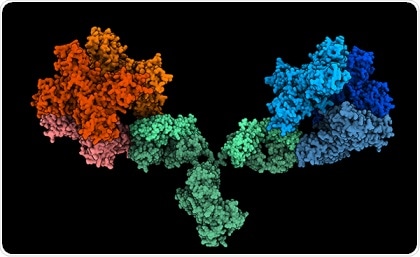A new study led by researchers from The University of Queensland (UQ) could help identify new therapies to reduce the global death rate caused by Zika, West Nile, and dengue viruses.

Image depicts the 1G5.3 antibody (green) bound to both Zika (red) and dengue (blue) NS1 proteins. It is based on structural data but idealized to showing binding to both viral proteins simultaneously. Image Credit: Associate Professor Daniel Watterson.
According to Daniel Watterson, an Associate Professor from UQ’s School of Chemistry and Molecular Biosciences, the team discovered an antibody that enhanced the survival percentage in laboratory trials and decreased the appearance of the virus in the blood.
We made a discovery in 2015 in the wake of the Zika outbreak that identified a new target for flavivirus treatments, a viral protein called NS1. Now we’ve shown for the first time that a single NS1 antibody can be protective against multiple flaviviruses including dengue, Zika and West Nile. No other antibody reported has shown such a broad range of protection. The improved protection we saw compared to existing treatments was really unexpected.”
Daniel Watterson, Associate Professor, School of Chemistry and Molecular Biosciences, University of Queensland
Each year, approximately 390 million individuals are infected with dengue worldwide, mainly in subtropical and tropical areas. Out of them, about half a million are affected by a more severe form of the disease that is lethal.
Dr Watterson added that the finding was significant because creating a vaccine for viruses like dengue is an unfulfilled global challenge.
Creating vaccines and therapies has been greatly hindered because antibodies that target the main viral envelope protein can also enhance disease. This phenomenon is called antibody dependent enhancement (ADE), and contributed to the complications arising from large-scale roll-out of the first licensed dengue vaccine. But because NS1 antibodies don’t drive ADE, our findings provide the blueprint for new and safe broad-spectrum vaccines against multiple flaviviruses, including dengue.”
Daniel Watterson, Associate Professor, School of Chemistry and Molecular Biosciences, University of Queensland
Dr Naphak Modhiran, lead author from UQ, explained that the antibody could also offer the first line of defense in any future global viral outbreaks.
The antibody binds to a wide range of flaviviruses including Usuto virus in Europe, and Rocio and Ilheus viruses in South America. These viruses have already caused local outbreaks in the past and have the potential to be the next Zika.”
Dr Naphak Modhiran, Study Lead Author, University of Queensland
Professor Paul Young, the co-author of the study, stated that the antibodies were first created by his group more than three decades ago.
“Since then, they have provided numerous insights into the biology of dengue and have been employed in the development of diagnostics. It’s great to see them now progressing as potential templates for therapeutics. This highlights the critical nature of discovery research in providing the foundation for translation into clinical practice,” concluded Professor Young.
New defence against dengue and emerging mosquito-borne viruses
Video Credit: University of Queensland.
Source:
Journal reference:
Modhiran, N., et al. (2021) A broadly protective antibody that targets the flavivirus NS1 protein. Science. doi.org/10.1126/science.abb9425